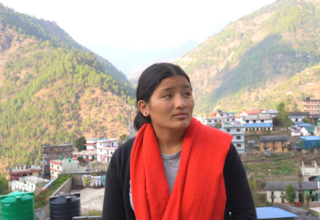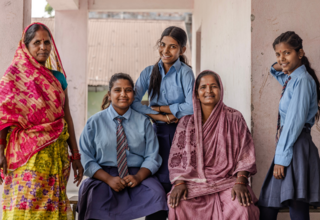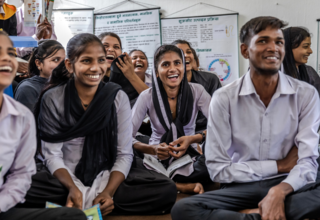UNFPA, the United Nations Population Fund, has been promoting adolescent girls’ empowerment and participation to advance their rights to health, education and employment in Nepal. In coordination with the government UNFPA has long supported adolescent girls’ circles, who receive training on life skills and support to end harmful practices in their communities. On the occasion of World Population Day, we interviewed four of these who embody the strength and spirit of this year’s World Population Day theme “Investing in teenage girls”.
Manmati Tailor (18), Hatairaj VDC, Baitadi district
When a baby boy is born in rural areas, families receive congratulations and even throw parties, whereas the birth of a girl is mostly a low-key affair. Traditionally girls are considered a financial burden in poor families. In sharp contrast, boys are usually counted upon to economically support their parents during their old age. The Adolescent Girls’ Circle of our VDC is working to changing the social norms that place greater value on sons than daughters.
If we invest in adolescent girls, they not only become empowered themselves, but can also make their families empowered.
Kaushila Saud (19), Duni VDC, Achham district
Child marriage is common in my village as well as across the district. Many parents don’t realize that child marriage can destroy girls’ lives. Our law prohibits marriage of underage girls. It says that the legal age of marriage is 20 for both girls and boys. However, girls continue to suffer as a result of the non-implementation of this legal provision.
Menstruating girls and women are not allowed to enter their houses, cook, touch others, go to school and eat nutritious food. The so-called tradition allows them only to have salted bread or rice till they stay in the shed. How can the onset of menstruation or delivery be impure? These all are natural processes. The Adolescent Girls’ Circle of Duni that I am part of is working to increase awareness among parents against harmful practices like child marriage and Chhaupadi.
Most of the villagers listen to teachers and look up to them. So I want to be a teacher after attaining a Bachelor's degree and teach as many villagers I can about negative socio-cultural practices.
I think investing in teenage girls means tackling the scourge of child marriage and other forms of violence they face.
Priyanka Bhatta (18), Samaiji VDC, Dadeldhura district
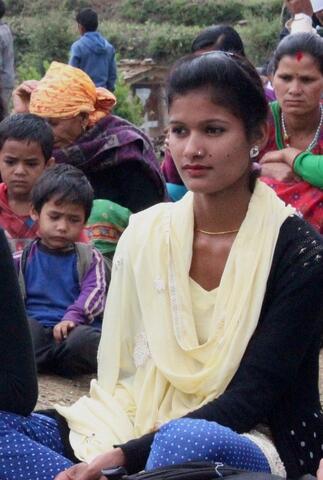 I am studying for a Bachelor’s degree (1st semester). My parents, who are not well educated, are so happy to have invested in my education. I am among few lucky girls in my village who could pursue my dreams for higher education. Education is something that is valued very much in my family.
I am studying for a Bachelor’s degree (1st semester). My parents, who are not well educated, are so happy to have invested in my education. I am among few lucky girls in my village who could pursue my dreams for higher education. Education is something that is valued very much in my family. On the contrary, many girls from poor, marginalized and Dalit families are deprived from education. Most of my childhood friends are already married off and some of them even have children. We have to change this. Education is the best thing that makes us act as catalysts for change.
We (members of Adolescent Girls’ Circles in Dadeldhura) often make door-to-door visits to raise awareness about the importance of education. Sometimes we distribute our own textless drawings that try to convey why girls need education.
It's always been my dream to secure a government job. Once my dream comes true, I will also be a social worker and take some of the work we have been doing at present to a next level.
Barsha BK (12), Bhaktipur VDC, Sarlahi district
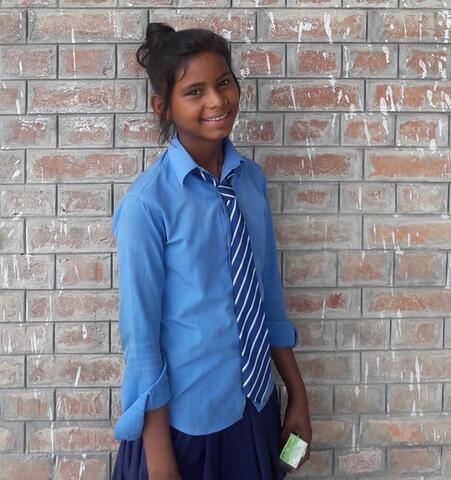 I am an adolescent girl. I have the right to receive accurate information related to my body. Reproductive health education and services for adolescent girls are still too little.
I am an adolescent girl. I have the right to receive accurate information related to my body. Reproductive health education and services for adolescent girls are still too little.Many of my friends want to receive information about their menstruation disorders, HIV etc. But they don’t know where to go. The health post of our VDC is not adolescent-friendly yet. But soon they are going to establish a dedicated adolescent information corner. This is a good investment.
All adolescents of my district and also of my country must have access to adolescent-friendly health services.

